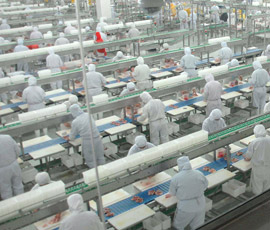Poultry processors treat workers better

The treatment of both British and migrant agency workers in the meat and poultry processing industry has improved markedly in the past two years, according to a report from the Equality and Human Rights Commission.
The commission set up a taskforce two years ago following a wide-ranging inquiry into recruitment and employment practices.
This had revealed a culture in which workers reported physical and verbal abuse, a lack of proper health and safety protection and poor treatment – particularly of pregnant women.
The inquiry also highlighted tensions between different nationalities working together in the sector, and found recruitment practices that may have indirectly blocked British workers from getting jobs.
Many workers had little knowledge of their rights and feared raising concerns would lead to dismissal.
As a result of this, a taskforce was set up, with the major supermarkets and industry bodies agreeing new management practices and key performance indicators to deal with most of the problems.
These have been rolled out to meat and poultry processing firms supplying most of the major supermarkets.
The commission’s review of progress, just published, highlights clear signs of progress.
“On the whole, pregnant workers are treated significantly better, workers are no longer segregated by nationality or suffer physical abuse and British workers no longer experienced difficulties registering with agencies due to their nationality,” said a statement.
To ensure that the industry continues to make progress, the commission also makes a series of further recommendations for firms, agencies, supermarkets and government including:
- training for managers
- audits by supermarkets of suppliers and agencies
- support for workers raising issues of concern
- health and safety
Commission chief executive Mark Hammond said the original inquiry had exposed serious flaws in the way the meat processing sector treated its workers. “But rather than taking expensive and bureaucratic enforcement action, we decided to support the industry to improve its own recruitment and employment practices. I’m pleased that our review finds that we have seen good progress.”
British Poultry Council chairman John Reed said the BPC had been a partner in the process from the start and was working with the British Retail Consortium to implement performance indicators. “It is important that responsible companies set an example for others in the standards they asire to and the work they put in to ensure those standards are met,” he said.
The commission’s findings follow a recent high-profile case in which the Gangmasters Licensing Authority suspended a hen-catching supplier for alleged abuse of Lithuanian workers.
